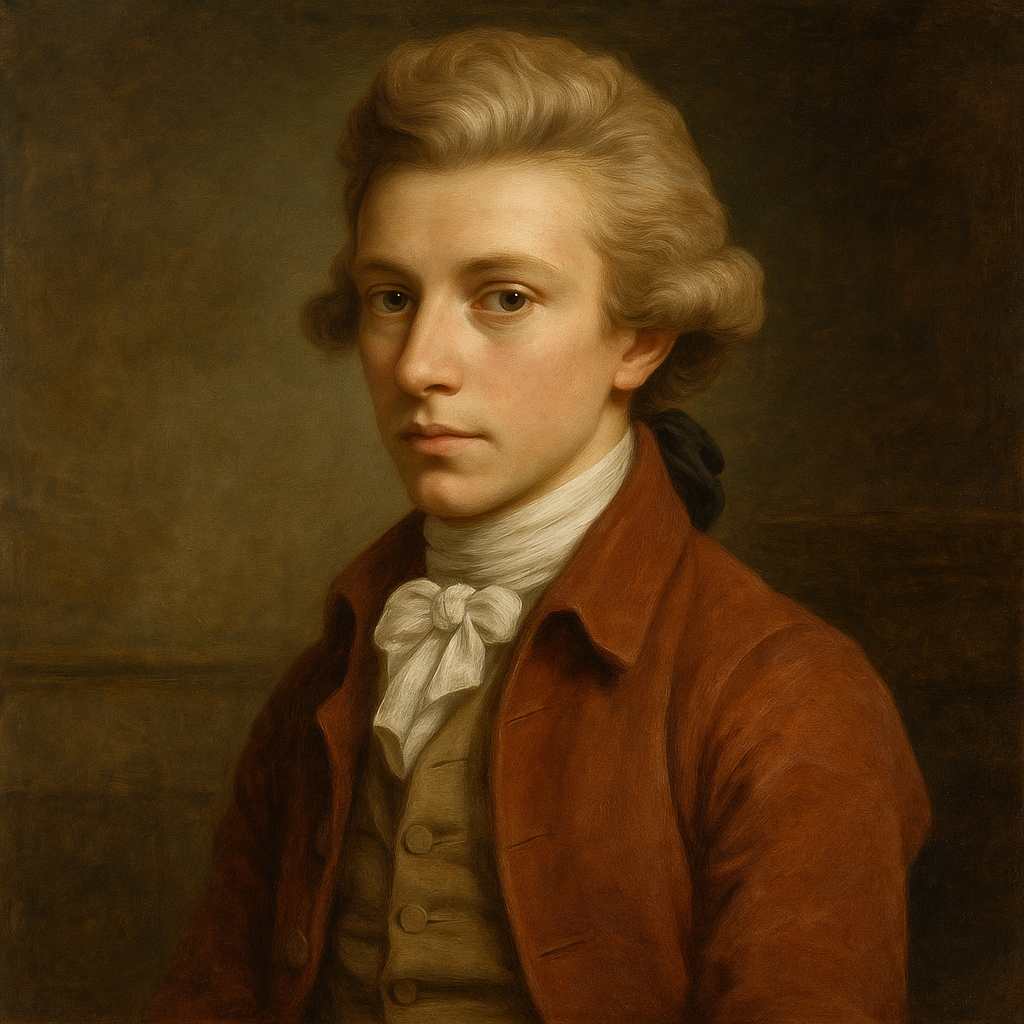The Resignation
Thomas Chatterton
1752 to 1770

O God, whose thunder shakes the sky,
Whose eye this atom globe surveys,
To thee, my only rock, I fly,
Thy mercy in thy justice praise.
The mystic mazes of thy will,
The shadows of celestial light,
Are past the pow'r of human skill,—
But what th' Eternal acts is right.
O teach me in the trying hour,
When anguish swells the dewy tear,
To still my sorrows, own thy pow'r,
Thy goodness love, thy justice fear.
If in this bosom aught but Thee
Encroaching sought a boundless sway,
Omniscience could the danger see,
And Mercy look the cause away.
Then why, my soul, dost thou complain?
Why drooping seek the dark recess?
Shake off the melancholy chain.
For God created all to bless.
But ah! my breast is human still;
The rising sigh, the falling tear,
My languid vitals' feeble rill,
The sickness of my soul declare.
But yet, with fortitude resigned,
I'll thank th' inflicter of the blow;
Forbid the sigh, compose my mind,
Nor let the gush of mis'ry flow.
The gloomy mantle of the night,
Which on my sinking spirit steals,
Will vanish at the morning light,
Which God, my East, my sun reveals.
Thomas Chatterton's The Resignation
Introduction
Thomas Chatterton's "The Resignation" stands as a poignant exploration of faith, doubt, and human frailty in the face of divine omnipotence. This analysis delves into the intricate layers of Chatterton's work, examining its thematic complexity, structural nuances, and historical context. As we unravel the poem's rich tapestry, we will see how Chatterton, despite his youth, grappled with profound existential questions that continue to resonate with readers centuries later.
Historical Context and Authorship
Thomas Chatterton, often referred to as the "marvelous boy," lived a tragically short life from 1752 to 1770. His precocious talent and untimely death at the age of 17 have cemented his place in literary history as a symbol of unfulfilled potential. "The Resignation" exemplifies Chatterton's mature handling of complex theological concepts, belying his young age and foreshadowing the depth of thought that might have developed had he lived longer.
The poem's creation must be understood within the context of the 18th century's religious and philosophical climate. The Enlightenment had ushered in an era of questioning traditional beliefs, yet religious faith remained a cornerstone of society. Chatterton's work reflects this tension, embodying both deep-seated faith and the emerging spirit of intellectual inquiry.
Thematic Analysis
At its core, "The Resignation" is a meditation on the human struggle to reconcile personal suffering with belief in a benevolent deity. The poem's speaker grapples with the age-old question of theodicy: how can a good God allow evil and suffering to exist? This central conflict drives the narrative arc of the poem, from initial supplication to final acceptance.
The theme of divine omnipotence is established immediately in the opening stanza: "O God, whose thunder shakes the sky, / Whose eye this atom globe surveys." This juxtaposition of cosmic power and minute observation sets the stage for the speaker's exploration of his place within the grand scheme of creation.
Humility and human limitation form another crucial theme. The lines "The mystic mazes of thy will, / The shadows of celestial light, / Are past the pow'r of human skill" acknowledge the inscrutability of divine purpose, echoing the biblical Book of Job. This admission of human inadequacy to comprehend God's ways is a recurring motif throughout religious literature and philosophy.
The concept of resignation, as suggested by the title, permeates the poem. However, it is not a passive acceptance but an active struggle towards submission to divine will. This internal conflict is vividly portrayed in the vacillation between despair and hope, doubt and faith, that characterizes the poem's emotional journey.
Structural and Stylistic Elements
Chatterton employs a consistent ABAB rhyme scheme throughout the poem's eight quatrains, lending it a sense of order and progression that mirrors the speaker's journey towards acceptance. This structural regularity contrasts with the tumultuous emotional content, creating a tension that underscores the poem's themes.
The use of enjambment, particularly notable in lines such as "If in this bosom aught but Thee / Encroaching sought a boundless sway," creates a flowing narrative that mimics the speaker's stream of consciousness. This technique allows Chatterton to maintain the formal structure while imbuing the poem with a sense of natural, unfolding thought.
Chatterton's diction is elevated and archaic, even for his time, with words like "thee," "thy," and "aught" contributing to a solemn, reverent tone. This stylistic choice reinforces the poem's engagement with weighty theological concepts and places it within a tradition of devotional poetry.
Metaphor and imagery play crucial roles in conveying the poem's abstract concepts. The "mystic mazes" and "shadows of celestial light" create a sense of divine mystery, while the "melancholy chain" and "gloomy mantle of the night" viscerally represent the speaker's emotional turmoil.
The Journey from Doubt to Faith
The poem's narrative arc traces the speaker's spiritual and emotional journey. It begins with an acknowledgment of God's power and a plea for mercy. The middle stanzas explore the depths of human suffering and doubt, with lines like "But ah! my breast is human still; / The rising sigh, the falling tear" giving voice to the speaker's anguish.
A turning point occurs in the seventh stanza, marked by the words "But yet, with fortitude resigned." This shift signals the speaker's decision to embrace resignation, not as defeat, but as a conscious act of faith. The final stanza's image of darkness vanishing with the "morning light, / Which God, my East, my sun reveals" represents a hard-won epiphany and return to faith.
This progression from doubt to renewed belief mirrors many religious narratives and personal testimonies, giving the poem a universal quality that transcends its specific historical context.
Literary and Philosophical Influences
Chatterton's work shows clear influences from earlier religious poetry, particularly that of the metaphysical poets like John Donne and George Herbert. The poem's wrestling with divine concepts and use of extended metaphors echoes their style, though Chatterton's voice remains distinctly his own.
The influence of 18th-century philosophy is also evident. The poem's rational approach to faith, attempting to "praise" God's "mercy in thy justice," reflects Enlightenment thinking. However, the ultimate embrace of mystery and the limitations of human understanding suggests a proto-Romantic sensibility, foreshadowing the movement that would follow in the wake of Chatterton's brief life.
Conclusion
"The Resignation" stands as a testament to Thomas Chatterton's remarkable ability to engage with complex theological and existential questions. Through its carefully crafted structure, vivid imagery, and emotional depth, the poem offers a timeless exploration of the human struggle with faith and suffering.
Chatterton's work continues to resonate with readers not only because of its technical skill but because it touches on universal human experiences. The poem's journey from despair to hope, from questioning to acceptance, reflects a pattern familiar to many who have grappled with faith in the face of life's challenges.
In analyzing "The Resignation," we gain insight not only into Chatterton's precocious talent but also into the broader cultural and philosophical currents of his time. The poem serves as a bridge between the rationalism of the Enlightenment and the emotional depth of Romanticism, embodying the tensions and transitions of its era.
Ultimately, "The Resignation" invites us to consider our own relationship with faith, doubt, and the search for meaning in a world that often seems chaotic and unjust. It reminds us that the struggle to reconcile human suffering with divine benevolence is an enduring aspect of the spiritual journey, one that continues to challenge and inspire us across the centuries.
This text was generated by AI and is for reference only. Learn more
Want to join the discussion? Reopen or create a unique username to comment. No personal details required!



Comments
No comments yet. Be the first to comment!